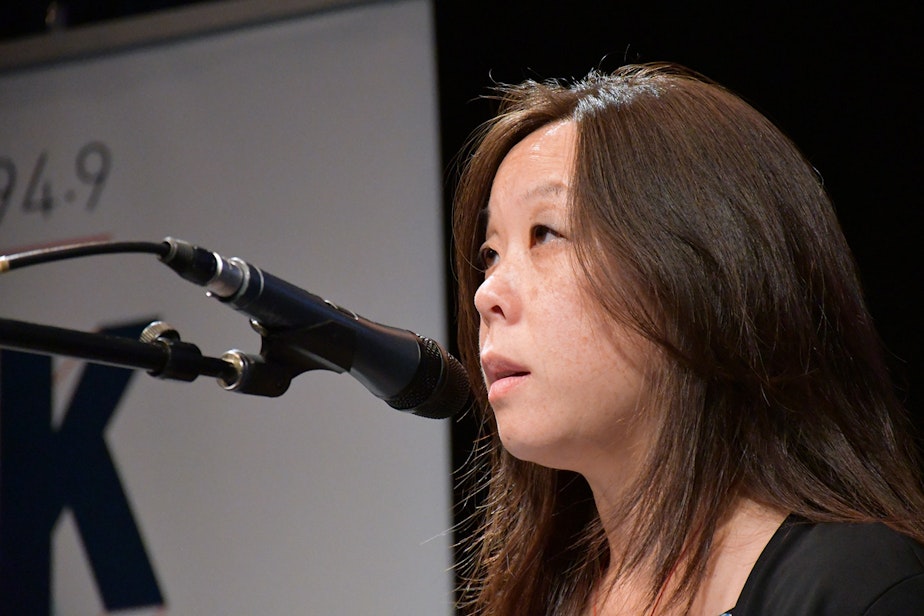The moral dilemma of a Buddhist on a squid jigging trip

The passengers aboard our Puget Sound-bound vessel included a bespoke shoemaker, a floral designer, and two lawyers. A group of strangers had assembled together on a rainy winter night to experience squid jigging.
I was standing beside Evan, a retired smokejumper, when he pulled the juvenile squid out of the Salish Sea. Our marine biologist-in-residence for the night came over to examine the freshly caught specimen.
I felt a terrible sense of responsibility for this animal’s life — it had been preparing to spawn when the lighted lures hanging off of our barge attracted him to swim towards our vessel.
The opalescent animal met my gaze with an unblinking and silent stare.
As the scientist prodded the miniature squid, he released a spurt of black ink that stained the creases of Evan’s weathered palm.
Sponsored
My professional work puts me in a position to design and produce uncommon experiences for people. My friend David had come to me with the idea of organizing a squid fishing expedition that could celebrate a unique Pacific Northwest tradition — a migration that can be seen late at night along the piers of Elliott Bay and West Seattle throughout late fall and early winter.
The eerie beauty of the luminescent lures and fishing lines of squid jiggers rivals only the magic of walking into low tide at midnight to encounter hundreds of razor clam diggers outfitted in headlamps as they overturn sand along the shoreline.
These romantic images filled my imagination when I agreed to produce the event and chartered a private boat.
But I came too late to realizing the horror of what we were actually planning: A hunting expedition where kinship with nature would mean taking a life.
I’m a Buddhist. I’d taken vows to do no harm, to respect all life and to honor all sentient beings.
Sponsored
David pulled out a sheet of fine art Strathmore and spread the squid’s figure over the textured white paper, so that the guests on the boat could examine it more closely beneath a bright light. As the group gathered around the limp squid, the marine biologist scraped a plastic fork across its body to activate a rainbow of chromatophores.
I felt myself in the active act of breaking a vow.
I had violated a commitment.
And not only did I feel a profound disconnection to nature, I felt aware of being cut off from my own humanity.
“Does it feel pain?” someone asked. “Does it understand what’s happening to it?”
Sponsored
The scientist was diplomatic when he declared, “They have very highly developed sensory systems.”
I was blinded by the tears filling my eyes and walked towards the back of the boat, where I could quietly weep unnoticed, as the biologist continued lecturing on cephalopod biology. I’d dreaded this moment the entire night and quietly prayed that we’d fail at our expedition.
That moment of gazing into the eyes of a dying squid was my personal turning of the wheel.
Prince Siddartha touched it when he walked out beyond the palace walls to see a freshly plowed field that exposed the earthworms who made their homes there. The worms wriggled in distress trying desperately to find cover, while others writhed in pain having just been cleaved in two.
All beings suffer. But in this case, I contributed to creating suffering for another soul.
Sponsored
These events weigh upon me still.
So often communion with nature involves the sublime, some experience of obliteration. In my ill-fated fishing expedition, it included an enactment of power upon a being whose life was perceived as lesser.
We were wrong. I was wrong. No life has more value over another.
As the squid expired, someone bagged it and threw it into a plastic cooler. What remained was a natural imprint of the animal’s body left behind on paper, in the tradition of a Japanese gyotaku (or fish print) — a record of the night’s catch.
In another print, drips of opalescent squid ink shimmer with gold. When I look at this image, I think of kintsugi, shattered ceramics that are carefully mended with a lacquer resin mixed with powdered gold.
Ruptures and mending are part of the history. The damage is visible — and still somehow unspeakable in its beauty.
This story by Shin Yu Pai, former poet laureate of Redmond, Washington, comes from a special event hosted by KUOW. On Friday, October 14, we gathered to enjoy "Stories from THE WILD" with eight stories presented in front of a live audience at Seattle's McCaw Hall.





